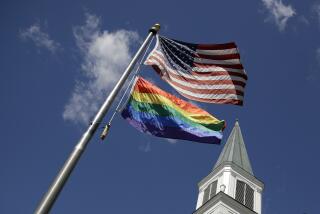Church Council May Seek New Alliances
Policy makers for the National Council of Churches, faced with growing deficits and a nagging identity crisis, have taken steps to cut back the liberal ecumenical organization while at the same time possibly looking to form new alliances with Roman Catholic and conservative evangelical groups.
The NCC’s 260-member governing board, made up of representatives from its 32 Protestant and Orthodox communions, recently set up a 15-member task force to map ways for the continued functioning of a leaner council.
The panel also was directed to explore the possibility of a new and more inclusive alliance of Christian groups in this country and to reach out to such major religious groups as Jews and Muslims.
“Such a process would entail a willingness on the part of the National Council of Churches and its programs to die in order that new life might spring forth as a stronger witness to our unity in Christ,” said the report adopted by the governing board at its three-day meeting this month in Tarrytown, N.Y.
‘Equality and Openness’
“Churches currently joined in the national council desire to reach out in Christian love and on a basis of equality and openness to other communions, including the Roman Catholic Church and conservative evangelical churches, in order that the institutional manifestation of our unity might embrace all who profess Christ as the head of the church,” the report said.
The National Council of Churches was formed shortly after the end of World War II, an era when mainline Protestant churches were prospering and growing.
Capitalizing on the idealism of a postwar America, it was the logical manifestation of the ecumenical spirit of the time.
Its contributions to American life have been manifold.
Through the council’s relief and service arm, Church World Service, hundreds of thousands of displaced people from refugee camps in Germany were resettled in this country.
Over the years, Church World Service also has provided millions of dollars worth of emergency aid to victims of disasters around the world.
The council engaged the top biblical and linguistic scholars to study newly discovered manuscripts and produce the Revised Standard Version of the Bible, the most widely accepted of the spate of new versions that began appearing in the 1950s and ‘60s.
During the 1960s, the council mobilized the considerable weight of mainline churches behind the civil rights struggle. It was effective in mobilizing opinion--and votes--behind civil rights legislation and in a variety of programs, including one that sent hundreds of college students into Southern communities for voter registration drives.
During the 1970s, it mobilized church opposition to the Vietnam War.
Interreligious Relations
When the National Council of Churches was formed in 1950, any thought of an organization that would include both Catholics and Protestants was out of the question.
But since the Second Vatican Council a quarter century ago, relations between the two branches of Christendom have improved markedly.
Catholic groups participate in some units of the council and Catholic priests and nuns have held high-level council positions.
As the cooperative voice for mainstream Protestantism, over the years the council has taken positions--often controversial--on social and economic issues. The liberal stances have sometimes proved costly in terms of the antagonism created and the withholding of support by angry constituents.
The council’s member churches have had their own problems in declining membership and financing over the years. The United Methodist Church, for example, the largest member denomination, has dropped from 10.5 million members in 1970 to 9.1 million members today.
Presbyterians have gone from 4 million to 3 million in the same period; the Episcopal Church from 3.3 million to 2.5 million, and the United Church of Christ from 2 million to 1.7 million.
For two decades, declining revenue has forced continuing cutbacks within the council. The size of the professional staff has been cut from 187 in 1968 to 83 in 1987 to a projected 61 next year.
Many of the 32 member communions of the council provide only token support.
Council spokesman Martin Bailey said that nine denominations provide 99% of the agency’s funding and that 81.5% comes from four denominations: United Methodist, Presbyterian, United Church of Christ and Christian Churches (Disciples of Christ.)
Despite the obvious problems, the governing board expressed confidence last week that the reorganized structure would be viable because the member churches “have not reduced our commitment to an ecumenical vision.”
More to Read
Sign up for Essential California
The most important California stories and recommendations in your inbox every morning.
You may occasionally receive promotional content from the Los Angeles Times.










